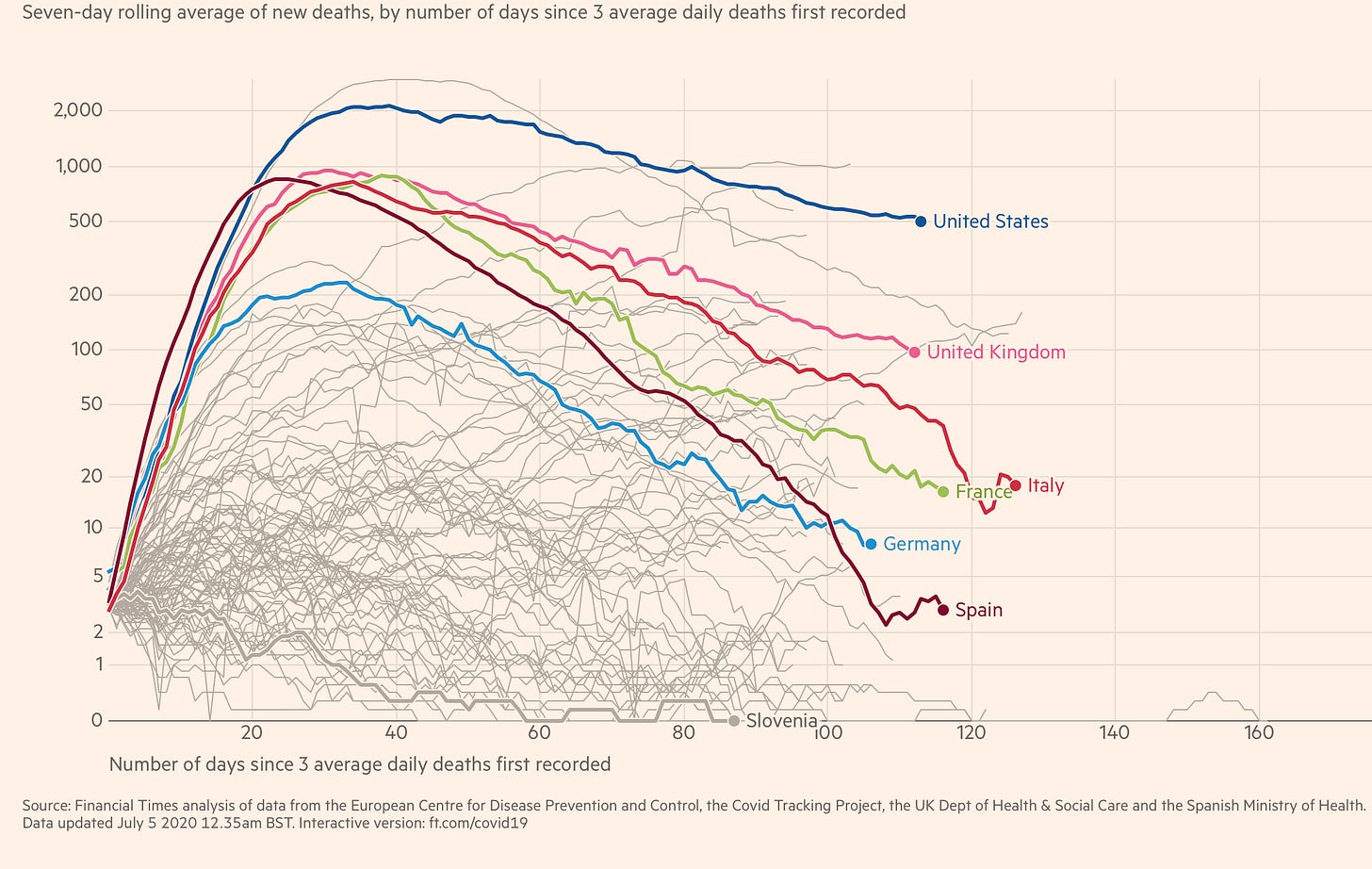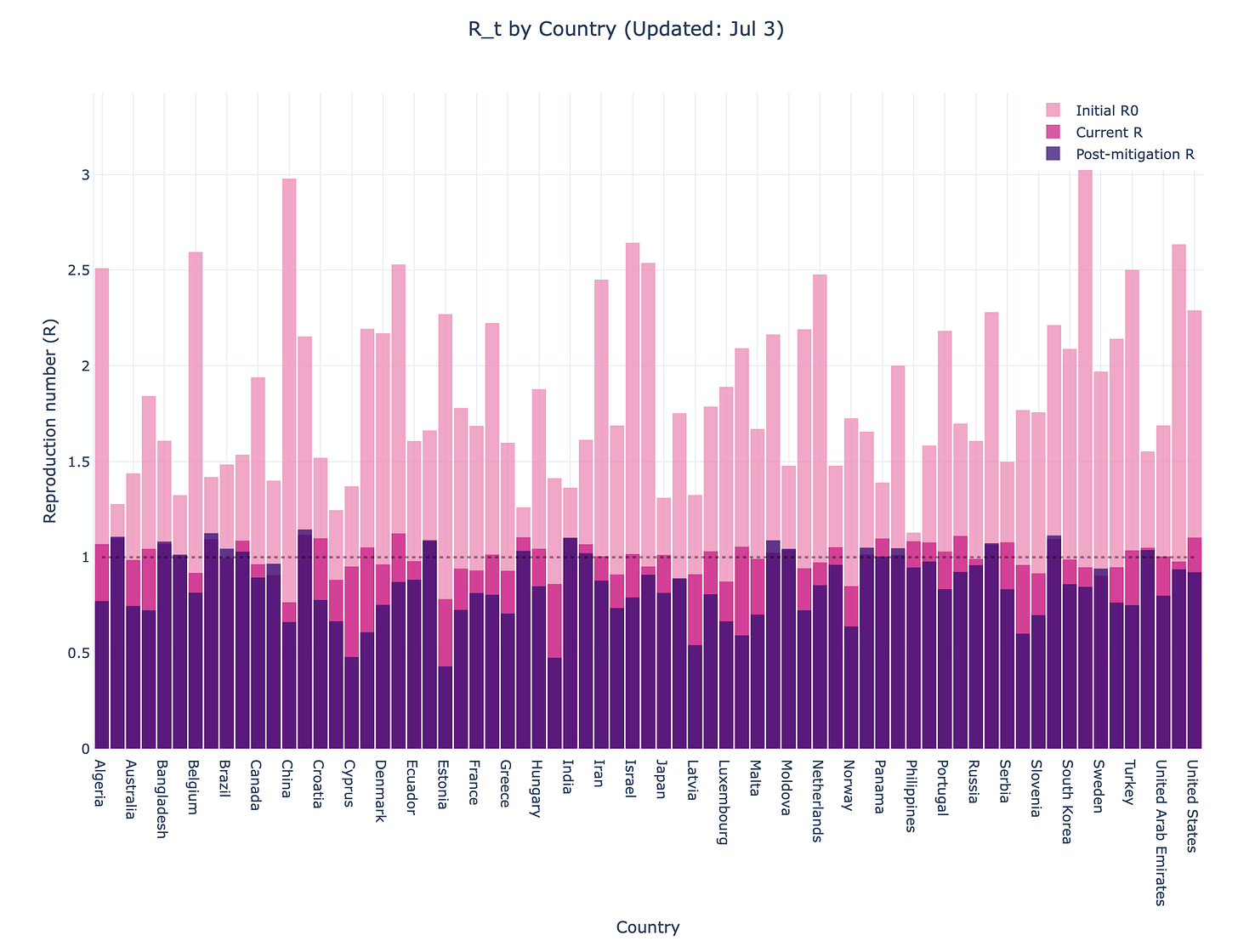🦠 COVID-19 | Perturbing the science
📊 Daily Data Brief: July 05, 2020, 04:43 GMT (❗️July 02, 2020, 08:02 GMT)
Cumulative case: 11,386,145 (+566,383) cumulative cases
Active cases: 4,407,611 (+147,459) (this is the number of currently infected patients)
Total Deaths: 533,570 (+14,298)
Serious/Critical Cases: 58,485 (+544)
Recovered: 6,444,964 (+404,626)
Source: Worldometers
1) Seven-day rolling average of new deaths(ECDC data)

Showing a chart from the FT today highlighting the worrying situation in Brazil, Mexico, India and Russia and Iran (NEW❗️). Also the FT comparative charts now allow up to 6 countries.

2) Rt estimate per State (US) (NEW❗️changed to RT.live which offers better visualisation of States above whose Rt>1).


Some of the most optimistic and relentless person in fact-checking and educating the public on this pandemic, Carl Bergstrom, is finding it difficult to see where the US got to with regards to COVID-19.



A great review looking at the remaining knowledge gaps on COVID-19 despite the exceptional progress made by the scientific community globally and in a relatively short period of time.
Two great twitter threads on what went wrong in California and why the data on cases not increasing nationally in the US might be misleading.
A potentially disconcerting videos of revellers in Soho (London) on the UK’s first day of pub reopening.
A great diagram on risk assessment of various activities whilst SARS-CoV-2 still circulates.
Two great contributions from the Human Vaccine Project: an interview on where we stand with the vaccine race and avoiding the temptation to sacrifice safety to speed and a podcast with Professor Crotty on T cells and SARS-CoV-2.
A critical article on the value of the widely publicised and now sacrosanct Rt - the reproduction number.
The UK made the most of being one of the most infected country in the world to run a well designed and already conclusive multiple drug trials where others have failed thus far.
A Nobel Laureate in economics sensing a change in Washington on the scale of resourcing needed to implement critical and at-scale contact tracing to successfully contain the pandemic in the US.
Finally, a report on an open letter to the WHO urging the agency to change its assessment on SARS-CoV-2 aerosol transmission.
🦠 Article of the day: Ewen Callaway, Heidi Ledford and Smriti Mallapaty write “Six months of coronavirus: the mysteries scientists are still racing to solve” for Nature. (Link)
As the authors write, science has moved at unprecedented speed in understanding SARS-CoV-2:
“It has also catalysed a research revolution, as scientists, doctors and other scholars have worked at breakneck speed to understand COVID-19 and the virus that causes it: SARS-CoV-2.”
And yet but also somewhat unsurprisingly given the timeframe, a number of mysteries remain. The authors dissect five of them:
Why do people respond so differently?
What’s the nature of immunity and how long does it last?
Has the virus developed any worrying mutations?
How well will a vaccine work?
What is the origin of the virus?
A very informative read, and one which highlights some of the difficulty of policy making whilst these uncertainty remain. Uncertainty in policy making demands honesty, transparency and openness from leaders to engage and gain the trust of the public. It has been lacking.
If leadership fails, it is up to articles as these to help the public and ultimately inform its response.
🛑 Video of the day: “Pub reopening in London”. Yesterday was the first day that public houses (also known as pubs) reopened in London. And here is a video of what it looked like in Soho, London (Link)
Threads of the day:
📈 Thread 1: “Why are COVID cases increasing while deaths are decreasing?” or is it really what is happening. A good analysis of what the optimists or deniers of the seriousness of the epidemic have been lynching on to and a good video on Simpson’s Paradox. (Twitter thread)

Beckett shows that in two of the states contributing to the recent accelerating surge of cases in the US, deaths are already increasing:



Beckett concludes by stating that it is more helpful to look at the epidemic as a number of discrete foyers rather than look at national numbers:


Horrifying as Beckett writes.
😷Thread 2: “How California fell off the rails”. Bob Wachter (Chair of Medicine at UCSF) writes a thread looking at mistakes made in controlling he epidemic and how we can learn and do better going forward. A lot around public messaging and masks. (Twitter thread)


Wachter argues that unlike in other states there was no significant governance issues in California. He focuses instead on two areas: 1) mask and public messaging about mask wearing and 2) public behaviour
On masks he writes:

It highlights a broader problem at the interface of science and politics and how science in progress however fast it advances can quickly get politicised in the age of distrust and social media.
Wachter continues on the difficulty of asking people to wear mask. He cites UK psychologist James Reason and the challenge of sustained public adherence once past or post politicisation:

The end of the thread deals with how do you get over that difficulty in a free society: a mandate or through better messaging. The problem is time is running out and governors and leaders will soon have to grasp the nettle with regards to universal masking.
🦠 Image of the day: “How risky?” Megan Ranney (Associate Professor of Emergency Medicine) shares a helpful diagram on current risk assessment of different activities to help individuals on risk assessing activities whilst the virus is still circulating. Obviously risk on all activities can be mitigated through the 3 Ws: Wear a mask, Watch your distance, and Wash your hands.


💉 “What worries me is that people do trust vaccines” an interview with Paul A. Offit, Director Vaccine Education Center at The Children's Hospital of Philadelphia.) (Link)
The politicisation of the vaccine remains one of the under reported stories of this pandemic. It has a number of wide-ranging implications from the upcoming US election to even more important long-term health implication and trust in vaccines.
Offit worries about sacrificing safety for speed in the race to a COVID-19 vaccine and undermining durably the trust of the population in vaccines generally at a time where the anti-vaxxers are gaining influence.
He also questions why the genetic-based vaccine have been prioritised by the US Operation Warp Speed as well as laments the opacity surrounding the decision. This is a topic which Jon Cohen expands on in an article for Science titled. “Operation Warp Speed’s opaque choices of COVID-19 vaccines draw Senate scrutiny”. Speed of these methods are one argument supporting such a decision, but it should not be the only one.
When asked about what keeps him up a night Offit replies:
“There is a system, which I trust, that has been in place since the 1950s to make sure that the vaccines that are brought into this country are tested as much as is reasonable to mitigate risks regarding safety and ecacy. This system involves the NIH, the CDC [US Centers for Disease Control and Prevention], and the FDA [US Food and Drug Administration]. As long as that system stays in place, I’m good. What worries me is that this system could be perturbed by an administration that perturbs the science.”
A great interview in an equally well-curated resource from the Human Vaccine Project.
🦠 David Adam writes “A guide to R — the pandemic’s misunderstood metric” in Nature.
As Adam points out early on:
“In this pandemic, R has leapt from the pages of academic journals into regular discussions by politicians and newspapers, framed as a number that will shape everyone’s lives.”
I was reluctant for a while to include them in the data section in the opening of the Corona Daily because of the inflated prominence which this number has received in the media. Adam writes a great explainer on why Rt is not the panacea it is presented to be.
Among some of the deficiencies and inherent weaknesses of R Adam outlines:
it is an average which might suffer from the same drawbacks highlighted by Miles Beckett with national numbers on cases and deaths in the US in the thread above
it does not account for superspreaders
it is a lagging indicator
Often decisions have to be made with imperfect data or residual uncertainty. One should not take Adam’s article as dismissive of Rt measures in guiding policy but definitely one rightly degrading its importance and reliability. (Link)
💊 Kai Kupferschmidt write “One U.K. trial is transforming COVID-19 treatment. Why haven’t others delivered more results?”. Beyond its exceptional handling of the public health crisis has brought, the NHS has also run a stellar RECOVERY trial providing answers quickly and decisively where large scale trials like SOLIDARITY (run by WHO) or DISCOVERY (run by France INSERM) have yet to deliver. Kupferschmidt looks at the reasons why. (Link)
🧪 Paul Romer (Nobel laureate in economics) writes “The Most Important Policy Decision In Our Lifetimes”. A great thread from Romer on why the lines might be changing on contact tracing and test pooling to get this pandemic under control in the US. It is not so much the principle but the scale and accompanying funding needed o make it effective which is gaining prominence. (Link)
😷 Apoorva Mandavilli writes “239 Experts With 1 Big Claim: The Coronavirus Is Airborne” for the New York Times. (Link)
Mandavilli reports on the back of an Open Letter written to the World Health Organisation (WHO) by 239 scientists from 32 countries calling the WHO to change its recommendation regarding airborne transmission of SARS-CoV-2 based on existing evidence. There is also a great accompanying Twitter thread from Bill Hanage (Harvard) on the article.
This is not the first time that the WHO is in the hot seat. The most recent controversies were on importance of aymptomatic and pre-symptomatic transmission and on mask wearing recommendation both of which Mandavilli highlights.
One of the most problematic stance of the WHO which repeatedly lands it in these controversies is mixing its recommendation in a shroud of paternalism and ultimately a distrust in the capacity of the public and the member states. The way it views his role is not accepted by all:
“In interviews, other scientists criticized this view as paternalistic. “‘We’re not going to say what we really think, because we think you can’t deal with it?’ I don’t think that’s right,” said Don Milton, an aerosol expert at the University of Maryland.”
In a way it is the same principle, which is at the opposite of the needed honesty, transparency and openness which might have also led the WHO to collude with China’s obfuscation at the start of this crisis…
🎙 Podcast of the day: Professor Shane Crotty on “T cell responses to SARS-CoV-2” during the COVID Lab meeting podcast organised by the excellent Human vaccine project. Following up on the reporting on the recent publication on T-cell-based immunity in the last edition of the Corona Daily, a podcast led by Professor Crotty who published a seminal paper in this area in mid-May. A great part of the podcast discussed the paper but Crotty also covers and answers question on the implication of his research for vaccine development. Fascinating and educational (Link)





